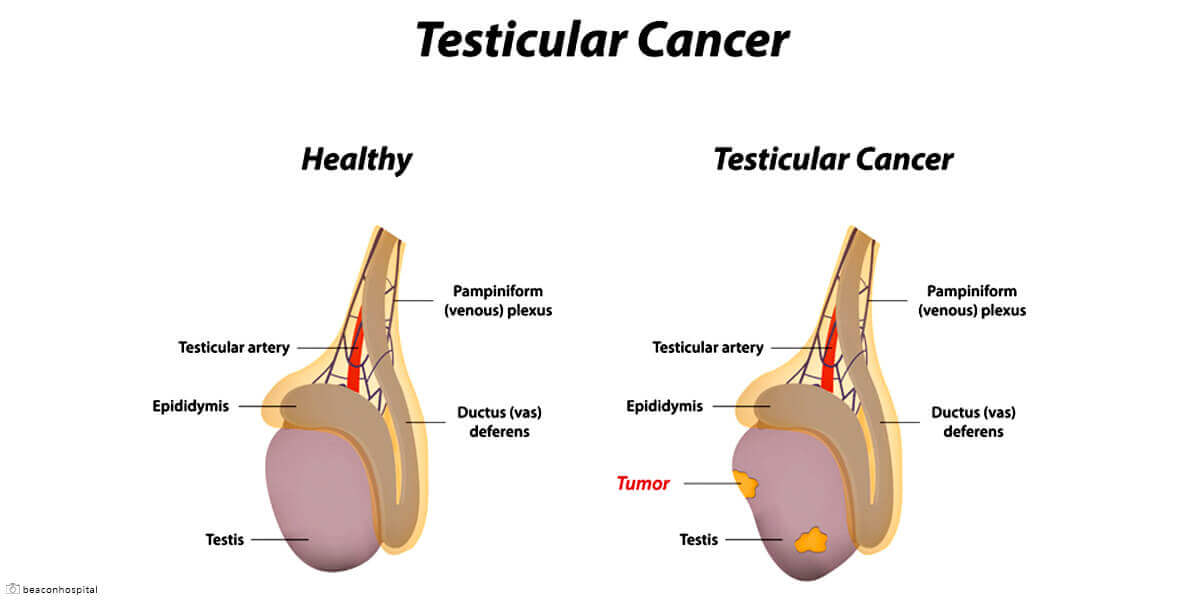Testicular cancer is a relatively rare type of cancer, accounting for just 1% of all cancers that occur in men. Testicular cancer is unusual compared with other cancers because it tends to affect younger men. Around 2,300 men are diagnosed with testicular cancer each year in the UK, though when it is caught early enough it is 97% curable. The best way to catch this early is to regularly perform a testicular exam.
Signs of testicular cancer may include:
- A painless lump on your testicle
- Swelling or a feeling of weight in your scrotum, with or without pain
- Fluid collecting in your testicles
- Pain or a dull ache in your scrotum or groin
- Soreness or changes in breast tissue
- Early signs of puberty in a younger boy
Doctors are not sure what exactly causes testicular cancer, although some studies suggest that you’re more likely to get it if you have:
- Testes that didn’t form or descend the way they should
- A father or brother who had it
Healthcare services have encouraged men to look out for tumours by performing a testicular exam themselves, and if that is something you feel confident about, the testicular exam guide from Dr Jeff’s website offers some beneficial advice on how to go about it. It is recommended that men should check their testicles approximately once a month:
- It is normal for one testicle to be larger than the other
- One testicle may sit lower than the other.
- Examine each testicle by using both hands to roll it between your thumb and fingers.
- Start at one end and work up or down.
- The epididymis is the rubbery cord-like structure behind each testicle and is usually palpable.
- If you do feel a lump or something like a piece of gravel, you should contact your doctor. Most are cysts, but we would always advise this is checked.
Rather disturbingly, despite men being encouraged to self examine, the pick-up rate of cancer from such explorations is very low. In fact, self-examination can cause high levels of anxiety, as false positives are very high. Many men report feeling anxious when finding anomalies in their testicles, however, there are various reasons for lumps and bumps and most of them are totally innocent. Testicle lumps are most commonly caused by fluid collecting, an infection, or swelling of skin or veins. However, it is not possible to diagnose the cause of a lump at home and this is why you should ask your doctor for a testicular examination, which in the vast majority of cases it will be a benign cause.
Unfortunately, there is no other method of initial diagnosis for testicular cancer than either self-examination once a month or by asking your GP to check them, and so the anxiety caused by self-examination is an unfortunate but unavoidable side effect if you want to reduce your overall risk. If you do find a lump during self-examination, do not ignore it. Ask your doctor to check it and he can advise you on what you need to look for, the changes that you would expect to see if it was something serious, and you can go home better informed and hopefully reassured about what is normal and what to look out for.
About Dr Jeff Foster

A Men’s Health specialist and Medical Director and founder of H3 Health. I’m passionate about raising awareness of all aspects of Men’s Health, and heavily involved in both teaching and health promotion. I’m a committee member of the British Society of Sexual Medicine, and have been involved in writing the most recent national guidelines for testosterone deficiency in men.
Get in touch with Dr Jeff
If you are a prospective patient and wish to see Dr Jeff privately, then you can book an appointment via H3 Health (03309 120769 – National Rate). Alternatively if you are a member of the Media, then please use our contact form for media enquiries.




